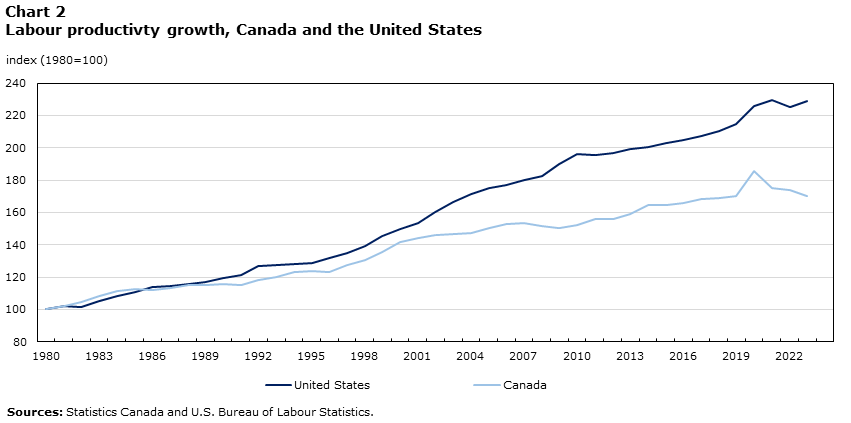A Deep Dive into the Debate on Canada's Productivity Challenges
Canada’s productivity has been a growing concern for years, and the gap between Canadian and U.S. productivity continues to widen. But what is the root cause of this issue? Is it deeply ingrained in Canadian culture, or is it a result of economic policies and structures?
This was the central debate at a recent event at Rothman (my alma mater), where leading experts weighed in on the reasons behind Canada’s productivity challenges. In this post, we’ll explore the key insights from the discussion and what it means for business owners, entrepreneurs, and the broader economy.

The Debate: Culture vs. Policy
At the event, two opposing perspectives emerged:
-
Culture is the Root Cause: Arguing in favor of this position were Philip Cross, Senior Fellow at the Fraser Institute, and Vass Bednar, Executive Director of the Master of Public Policy in Digital Society at McMaster University. Their perspective emphasized that Canada’s work culture and attitudes toward productivity may be limiting growth.
-
Economic Policies and Structures Are to Blame: Countering this argument were Stephen Poloz, former Governor of the Bank of Canada, and Jeremy Kronick, Vice President of Economic Analysis and Strategy at the C.D. Howe Institute. They focused on the structural and policy-driven aspects that may be suppressing productivity, such as high taxes, regulatory barriers, and lack of business incentives.
Moderating the conversation was Anne Gaviola, Senior Digital Broadcaster and Journalist at Global News, who facilitated a thought-provoking discussion that left attendees with much to consider.
The Numbers Don’t Lie: Canada’s Declining Productivity
One of the most eye-opening aspects of the discussion was the data presented on Canada’s productivity decline relative to the U.S.
- In 2000, Canadian productivity was at 82.4% of U.S. productivity.
- By 2020, this had dropped to 76.8%, a 5.6% decline.
- Relative to the United States, among G7 countries, we are now second only to Italy when it comes to productivity decline.

(picture source: Statcan)
This decline has continued despite technological advancements and increased global competition. The question remains: Why hasn’t Canada kept pace?
One pivotal moment in the discussion focused on the early 2000s - a period when the U.S. surged ahead while Canada stagnated. Many experts attributed this to the third industrial revolution and the rise of the internet, which significantly boosted U.S. productivity. Meanwhile, Canada failed to capitalize on these shifts at the same pace.
The Business Growth Problem: Why Do Canadian Businesses Struggle to Scale?
Another alarming statistic highlighted during the debate was that less than 5% of small businesses in Canada grow into enterprises.
- In the U.S., tax incentives encourage small businesses to reinvest in research and development (R&D), allowing them to scale.
- In Canada, the tax system does the opposite - businesses face high taxes on revenue, discouraging reinvestment and innovation.
This stagnation leads to fewer high-growth companies, less job creation, and a weaker economy overall.
"We are on the verge of a new industrial revolution with AI and automation. Are we going to stay behind, or will we take action?"
--Jores Minasvand
This is a critical moment for Canada’s economy. Without significant changes, the productivity gap will continue to grow.
How Culture Plays a Role
The cultural argument in the debate was compelling. It was noted that Canada has a deeply ingrained culture of deference, stability, and security, which - while beneficial in many ways - can sometimes discourage risk-taking and innovation.
Unions & Immigration: Taboo Topics or Key Parts of the System
The fact that we are starting to add culture to the conversation about productivity is a step forward. Yet, as with everything in life, Canada's productivity is part of a system. And we are inherently bad at seeing and thinking in systems. All the education we receive is linear. A causes B.
However, if we take a step back and try to see the whole system, a few more key points emerge. Unions, immigration, and leadership are all integral to Canada's productivity (and productivity in general). While the debate at Rotman didn't talk about these hot topics, they should be part of the conversation.
Unions served a purpose when they were initially introduced back in the 19th century as a result of the Industrial Revolution. However, it might be time to reconsider what role unions should play in the 21st century and beyond (if any).
- The unionized workforce in Canada creates stability but can also limit flexibility and incentive structures that drive performance.
- Entrepreneurial culture in Canada is still weak and developing compared to the U.S., where there is a stronger acceptance of risk and failure.
At the same time, immigration and cultural integration are also factors impacting productivity. How does an evolving demographic landscape influence work habits, ambition, and long-term economic growth?
In "Build to Last," Jim Collins presents a very compelling idea of why certain companies succeed. They keep the core and change everything else.
And at the core are certain values. For Disney, one core value used to be Family. And since they diverged from it we are now seeing the impact with millions cancelling subscriptions to Disney+.
When you think about it, countries are like companies but on a bigger scale and with a bit of a different structure. So, isn't it natural to consider that core values and culture are vital for the lasting development of any country? Including Canada?
The harsh truth is that Canada has lost its identity. Immigration is necessary for both the US and Canada. Yet, we don't consider whether the people who come into our countries have the mindset, attitude, and values that will help us continue building a prosperous nation.
Immigration has been a hot topic in the past years with the number of people who have been allowed to come to Canada. And also, more importantly, the quality of people.
I'm originally from Bulgaria, and I left a country and culture that tolerates cheating, lying, and bribery. A culture that focuses on "how I can win without caring whether others win as well". And even going a bit deeper to the level where people openly want to screw (pardon my French) the "country".
And when I start seeing these same traits in Canadian society, it makes me wonder what happened. Where did we go wrong?

The Role of Leadership in Productivity
Where did it go wrong? I have one word for you: leadership.
The debate didn't touch on this, although leadership was mentioned once in passing when it comes to economic policies and structures. Yet, the theme of leadership - or rather, the lack thereof - is an important topic to add to the conversation. It's also part of the system. And I would argue it is the key part.
"The biggest crisis today is a crisis of leadership."
-- Anna Angelova
Leadership drives both culture and policy. Without strong, forward-thinking leadership, businesses and the broader economy struggle to innovate and remain competitive. Seeing the current state of Canadian productivity and the overall trend of the past ten and even 25 years, it's normal to wonder whether Canada’s political and business leaders are making the right decisions to foster growth.
Strong leadership could help break the cycle of stagnation by:
- Implementing business-friendly policies that encourage entrepreneurship.
- Creating a culture of innovation and accountability at all levels.
- Ensuring that economic policies support, rather than hinder, growth.
The Path Forward: What Can Be Done?
While no definitive answers emerged, the debate sparked critical discussions about what needs to change.
The conversation made it clear that culture and policy are deeply intertwined. And we are now adding unions, immigration, and, most importantly, leadership to the picture of the Canadian productivity system.
As business owners and entrepreneurs, there are steps we can take to improve productivity at both the individual and national levels.
1. Shift the Mindset Around Productivity
Rather than just working more hours, we need to focus on working smarter - leveraging technology, automation, and better systems to improve efficiency.
2. Advocate for Pro-Business Policies
Business owners should push for tax incentives and R&D credits that encourage reinvestment and innovation. Supporting policies that help small businesses scale is critical.
3. Develop Stronger Leadership
We need more than just political leadership - we need thought leaders who will drive innovation and economic growth. We need leaders at every level and in every organization in Canada. And it all starts with us - the small business owners.
4. Foster an Entrepreneurial Culture
Encouraging risk-taking and innovation in schools, workplaces, and industries is crucial for long-term productivity growth.
Final Thoughts: Will Canada Step Up?
The debate at Rothman made one thing clear: Canada is at a crossroads. If we want to remain competitive, we need to take productivity seriously - both in our policies and in our mindset.
As business owners, entrepreneurs, and leaders, the question is: What role will we play in shaping the future of Canada’s economy?
What do you think is the biggest factor in Canada’s productivity challenges? Share your thoughts in the comments below.
And if you want to stay updated on productivity insights, strategies, and business growth tips, sign up for our newsletter today.
Author
Anna Angelova
